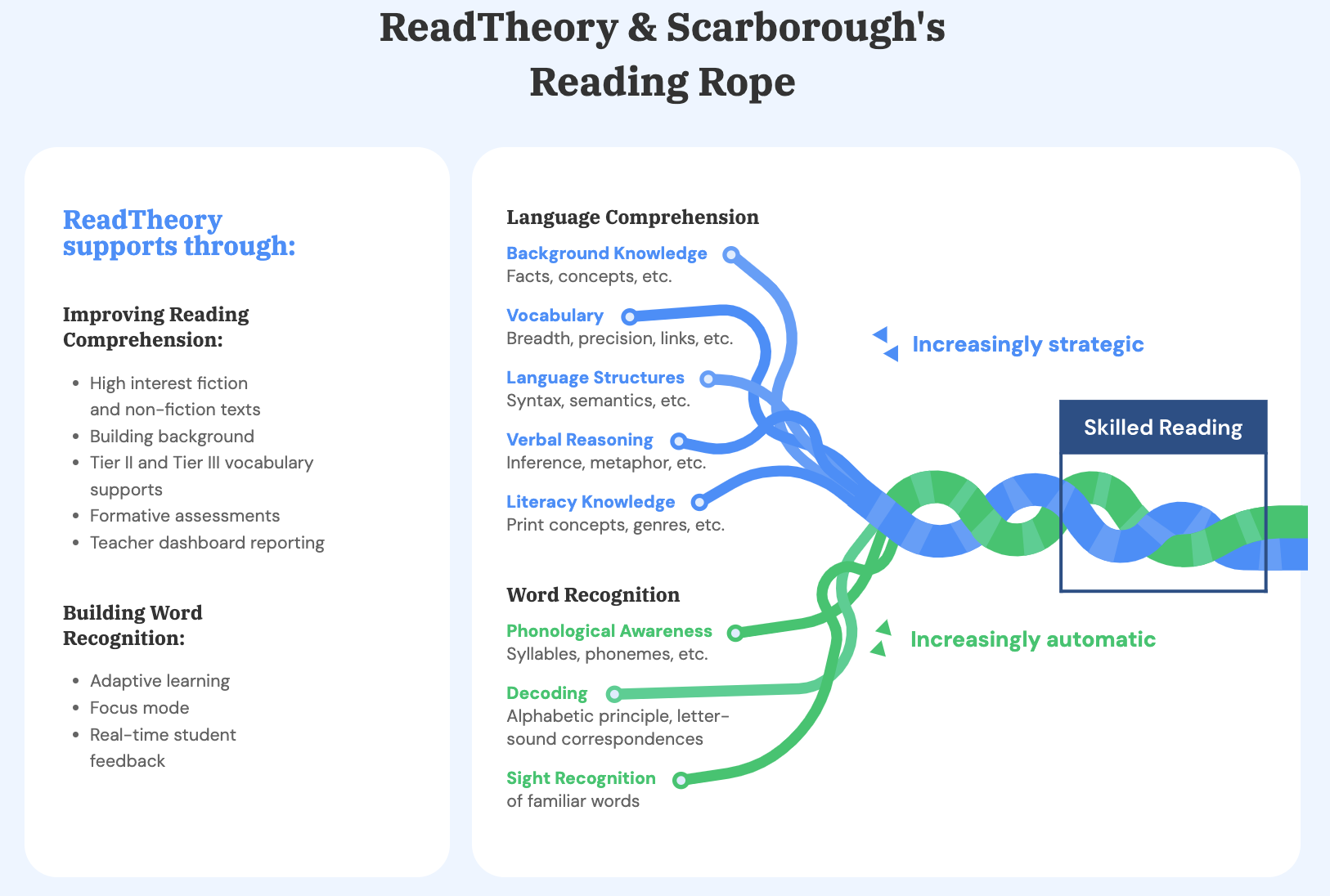When you hear the science of reading, for many of us images of young children sounding out words, practicing their phonics, and mastering the basics of reading might come to mind. While phonics is undoubtedly a cornerstone of early literacy, the science of reading encompasses much more than this foundational skill. In fact, effective reading instruction involves a comprehensive approach that integrates phonemic awareness, fluency, vocabulary, and comprehension.
ReadTheory is grounded in the science of reading and helps educators implement this science into their instruction seamlessly and by design. You may have heard of Scarborough’s Reading Rope. Scarborough’s Reading Rope is a widely recognized framework that illustrates the complex process of skilled reading. Developed by Dr. Hollis Scarborough, a leading researcher in literacy, the Reading Rope visually represents how different components of reading intertwine to produce fluent, skilled reading. This metaphor emphasizes that all these components are essential and work together. Weakness in any one strand can affect overall reading proficiency, but as each strand strengthens, the rope becomes stronger, leading to skilled, fluent reading.

The rope is divided into two main strands: Language Comprehension and Word Recognition. In this blog post, we’re going beyond word recognition, and sharing the best strategies for incorporating the Science of Reading into your classroom through Language Comprehension using ReadTheory.
Build Background Knowledge
When students have a solid foundation of prior knowledge, they can more easily make connections to new information, better understand complex texts, and engage more deeply with the material. Educators can support this by providing rich, varied experiences—such as discussions and real-world connections—that expand students’ knowledge base and prepare them to tackle a wide range of topics with confidence.
ReadTheory offers high-interest fiction and non-fiction texts that engage students and help them to make thematic and contextual connections across the curriculum and in real life. Research has proven, most famously in The Baseball Study by Recht & Leslie, where they found that students with strong background knowledge about baseball performed up to 33% better on reading comprehension assessments compared to their peers with less background knowledge on this topic. This significant difference highlights the critical role that prior knowledge plays in understanding and processing new information, particularly in academic settings.
Strengthen Vocabulary Acquisition
When students encounter new vocabulary that’s connected to what they already know, it taps into their existing mental framework, or schema, which makes the learning process more natural and effective. This approach is crucial in language acquisition because our brains are wired to build on familiar concepts. Educators who connect new words to what students already know find that their students are more likely to remember and use them.
ReadTheory introduces students to meaningful Tier II and Tier III vocabulary according to their unique Lexile levels as part of existing schema as opposed to isolated instruction. A study by Marzano & Pickering found that students who learned vocabulary words in context, connected to existing knowledge, had a 55% higher retention rate compared to those who learned vocabulary in isolation. The notion that meaningful vocabulary instruction, when connected to students’ existing schema and unique Lexile levels, enhances retention and application of new words is backed up by this rate.
Deepen Engagement with Texts
Continuous practice and real-time feedback helps students retain information and make steady progress toward becoming proficient readers, even between formal testing periods. That’s why it’s a great idea for educators to give high frequency, low stakes assessments.
ReadTheory increases retention and monitors student achievement through frequent low stakes formative assessments and writing prompts. A study conducted by Guthrie found that students who often engaged deeply with texts through strategies such as questioning, summarizing, and making connections were 35% more likely to improve their reading comprehension compared to students who did not use these strategies. This outcome highlights the importance of active engagement in deepening students’ understanding of the material.
Provide Strategic Instruction & Comprehension Practice
Strategic instruction and comprehension practice encourage students to think deeply about the text, analyze information, and apply the phonics and vocabulary knowledge in context. One way to do this is by incorporating frequent and varied reading opportunities to further strengthen comprehension skills.
Exposure to a variety of question types within ReadTheory, such as explicit and implicit questions, main idea, supporting details, inference, author’s purpose, vocabulary, and more, develops critical comprehension skills. A study by the National Reading Panel found that students who received explicit instruction in comprehension strategies showed an average improvement of 16% in reading comprehension compared to those who did not receive such instruction. The effectiveness of strategic instruction and targeted practice in boosting students’ comprehension skills is underscored by this study.
Implement Data-Based Instruction
Focusing on data when teaching ensures that instruction is evidence-based and tailored to each student’s individual needs, making both students and educators more accountable.
By using ReadTheory’s assessment data and dashboard reports, teachers can zoom in on individual strengths and areas for improvement, identify early intervention opportunities, provide targeted interventions, and monitor progress effectively. A study by Black and Wiliam found that when teachers used data to inform their instruction, students’ academic performance improved by an average of 30%, which emphasizes the significant impact that data-based instruction can have on student outcomes.
To start putting the science of reading into action, sign up for a free ReadTheory account. ReadTheory’s engaging platform immerses both educators and students in research-based reading practices. As students work through the differentiated reading passages and low-stakes formative assessments, they gradually develop into confident, independent readers.



